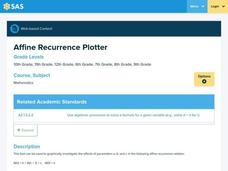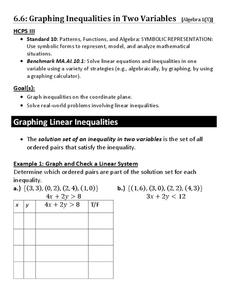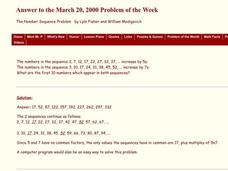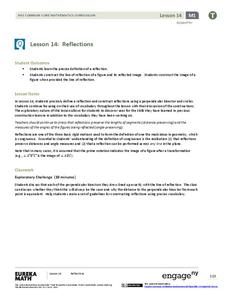Curated OER
Odd One Out
Which of these wacky shapes is different? Learners examine five rows of figures, each with a starting shape at the beginning. They determine which of the four following shapes looks different from the first, circling it. Consider having...
Math Worksheets Land
Patterns of Association (Using Data Tables) - Guided Lesson
The activity belongs to a four-part resource that applies percentages to data tables. The page has three practice problems that continues with the development of this topic.
Florida Center for Instructional Technology
Two for One Box Company
Given a box of certain dimensions, young mathematicians must determine if a box that is twice as big, actually holds twice as much. This is a brain-teaser of a problem. The worksheet provides a handy table that has learners calculate the...
Curated OER
Affine Recurrence Plotter
Learners use the on-line affine recurrence plotter to graph equations. They work on-line to create graphs of trout in a trout pond and savings account balances when interest is compounded over time. Links to the four one-day lessons are...
Curated OER
Learning 3 - Write the Number
Do this for numbers 1-10, but in this one youngsters just focus on the number three. First, they trace the digit three times (of course!) and try a few on their own. Next, scholars count how many bears, bowls, and beds there are, writing...
Curated OER
Two for One Box Company
Here is a challenging and thought-provoking math learning exercise. In it, learners work together to construct a variety of boxes of different sizes to see if doubling the size of a box really means it can hold twice as much stuff as the...
DK Publishing
Learning 4 - Write the Number
Focus on fours! First, young counters trace the number four (in numeral form) three times and print a few on their own. Next, they count Little Bo Peep's groups of sheep, recording each total. There are four of each, but encourage them...
Curated OER
Math: The Cathedral Project
Second graders take a field trip to a nearby church or other historical building and examine it from a mathematical perspective. In groups, they calculate the seating capacity, describe the window patterns, differentiate types of...
Ohio Department of Education
Describing and Creating Plane Figures - Grade One
Young mathematicians draw, create, and describe different shapes using triangles. They discuss attributes of the original and created shapes. Pupils classify the created shapes and draw and write in mathematics journals to communicate...
Curated OER
Addition: Number Bonds to 10
You have the answer and a variable, but something is missing! The class fills in the missing addend in 23 practice problems that all add up to 10. This is a great way to build number sense, pattern recognition, and automaticity.
Curated OER
Graphing Inequalities in Two Variables
This study guide is a great resource to help you present the steps to graphing linear inequalities. Show your class two different ways to graph an inequality and work on a real-world example together. The document could also be easily...
Illustrative Mathematics
Making a Ten (Grade 1)
How many ways can first graders make a 10? Using an addition chart, learners color in the 10s on the table. They notice and explain the meaning of the pattern, and how to get to another sum of 10.
Curated OER
Morning Math
Good morning, math scholars! There are 10 warm-ups here to get your class recalling past concepts and staying sharp on newer ones. Skills include writing an even and odd number sequence, subtracting money amounts, dividing shapes in...
Curated OER
Finish the Counting 10 Pattern
In this counting by 10 worksheet, students count by 10 to find the number pattern for each example. Students complete 5 examples.
Lesson This!
Math Lesson Plan: Handprint Counting by 5's
A handprint worksheet is provided to help youngsters practice skip counting by 5s. As a follow up, you could have little ones gather into groups to skip count their own fingers by fives.
Curated OER
The Number Sequence Problem
In this number sequence activity, students identify the next number in a sequence. This one-page activity contains 1 problem. The answer is provided at the bottom of the page.
ABCya
Math Bingo
It's sometimes the simple games that really grab a learner's attention. With this game-like app, young mathematicians can practice addition, subtraction, multiplication, and division facts. When they reach new high scores, they collect...
Curated OER
Domain: Operations and Algebraic Thinking
Practice basic operations for young mathematicians in fun ways! Using two decks of cards (Ace through 10 plus the joker), learners play "memory" by matching numbers that can be added to make 10 and writing number sentences. In another...
Education Closet
Equal Rhythms
Engage young mathematicians in learning about fractions with this cross-curricular math and music lesson. After listening to and repeating different beat patterns, children realize that musical notes are just another way of representing...
Illustrative Mathematics
Red and Blue Tiles
Here, second graders are tasked to find the patterns that have an even number of tiles. They are asked to think about why these patterns are even or odd and explain how they know.
Bowland
Fashionista
So trendy! Show your class how to identify trends in sales patterns using mathematics. Scholars use a software simulation to collect data on age groups, price, and sales at a fashion store. This data allows individuals to determine the...
Howard County Schools
Setting the Table
How many people can fit around a table? Depends on the size of the table, right? Explore patterns to generate an equation for the number of people that can fit around a table given its size.
EngageNY
Reflections
Facilitate creativity in your math class as individuals learn the definition of a geometric reflection and correctly construct a model, as well as its reflected image. They use a perpendicular bisector and circles to elaborate on...
Kenan Fellows
Least Squares Linear Regression in R
The task? Determine the how effective hospitals are at reducing the rate of hospital-acquired infections. The method? Data analysis! Using an open source software program, individuals use provided data and create scatterplots to look for...

























